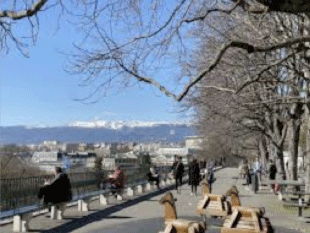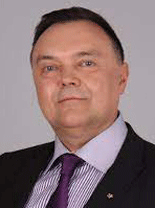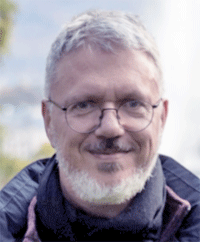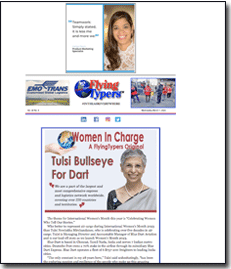

#INTHEAIREVERYWHERE
| |
 |
 #INTHEAIREVERYWHERE |
| Vol. 22 No. 10 | Friday
March 17,
2023 |
| |
Stronger Together Navigatating Uncertainties With FIATA |
A relatively new Italian writer, Beppe Sebaste, in 2008 published a book with a curious title: “Panchine”, i.e. park benches in Italian: an unusual book with no real plot, but with the declared purpose of “getting out of this world without getting out of it”.  In
his book, Sebaste describes the magnificence of the surroundings of some
of the most iconic benches in Europe, touching unparalleled artistic genius:
the author’s description of the benches in Rome’s gardens is
pure poetry. So is the description of two small benches in Geneva, where
his son was studying at the time. But Geneva is also the place where the
word “bench” finds an unexpected term of excellence. The longest
park bench in the world, as noted in the Guinness World Records: le
Banc de la Treille is precisely in Geneva and, albeit only in French,
enriches the city website with a qualified description. In
his book, Sebaste describes the magnificence of the surroundings of some
of the most iconic benches in Europe, touching unparalleled artistic genius:
the author’s description of the benches in Rome’s gardens is
pure poetry. So is the description of two small benches in Geneva, where
his son was studying at the time. But Geneva is also the place where the
word “bench” finds an unexpected term of excellence. The longest
park bench in the world, as noted in the Guinness World Records: le
Banc de la Treille is precisely in Geneva and, albeit only in French,
enriches the city website with a qualified description.Obviously there are thousands of other reasons why visiting Geneva is well worth the effort, but in my view this is a rather original one and for sure worth it. That is where I am heading today Friday, but the reason why I am packing to get to Geneva on 17th of March is of course another and has to do with FIATA, the all-time object of my attentions. Despite being now retired, I have kept my contacts with the many friends, and I make it a point to attend FIATA’s events whenever convenient. The next one coming up this week-end is the traditional spring meeting at the FIATA Headquarters (HQ). As FIATA’s very efficient communication team puts it, “this will be a unique opportunity to network with old and new acquaintances and familiarise yourself with the surroundings.” The HQ was originally just for association members to discuss their most important issues and keep delegates up to date with the policy items that were hitting the tables of the UN, but in the years it has been climbing to the level of an important spring gathering in international freight forwarding and logistics. It boasts an interesting programme of speakers and, while still being an event for FIATA Members, it manages to gather a growing number of participants, which comes as no surprise, given the numbers in FIATA’s membership base. Geneva is relatively close to Turin, where I live now, reachable in a few hours by car or train, despite the two cities being at either sides of the Mont Blanc, the highest mountain in Europe.  In
preparation of my arrival I had the opportunity to speak briefly with my
great friend Ivan Petrov, who is the President of FIATA, and I am happy
to share with our readers a short statement I have captured in the conversation.
“The highly anticipated FIATA Headquarters meeting of 2023 marks a
return to fully in-person meetings focusing on strengthening the bonds between
FIATA’s global membership as we prepare to ‘Navigate Uncertainty.’
The work of FIATA this year will be led by the Mission, Vision and Values
defined by the FIATA Presidency which was translated into 44 priorities
for the Headquarters Team to focus on. I am proud to welcome FIATA Members
from more than 60 countries who are attending this year’s meeting,
with 33 hours of sessions, to witness the transformational growth the organisation
has had since the Reset Programme, and to contribute to the various discussions
and workshops to foster the knowledge of its members to ensure a sustainable
and resilient supply chain.” In
preparation of my arrival I had the opportunity to speak briefly with my
great friend Ivan Petrov, who is the President of FIATA, and I am happy
to share with our readers a short statement I have captured in the conversation.
“The highly anticipated FIATA Headquarters meeting of 2023 marks a
return to fully in-person meetings focusing on strengthening the bonds between
FIATA’s global membership as we prepare to ‘Navigate Uncertainty.’
The work of FIATA this year will be led by the Mission, Vision and Values
defined by the FIATA Presidency which was translated into 44 priorities
for the Headquarters Team to focus on. I am proud to welcome FIATA Members
from more than 60 countries who are attending this year’s meeting,
with 33 hours of sessions, to witness the transformational growth the organisation
has had since the Reset Programme, and to contribute to the various discussions
and workshops to foster the knowledge of its members to ensure a sustainable
and resilient supply chain.” This
is a statement you can take seriously. FIATA has managed to pull together
a programme
that will kindle the appetite of its members and their guests. President
Petrov will open the HQ as tradition imposes, and our celebrated friend
Jan Hoffmann (please, read his interview
in one of the previous issues of the FlyingTypers) will be in charge of
the keynote, portraying an up-to-date picture of global trade and logistics
as only an institution like UNCTAD
can. This
is a statement you can take seriously. FIATA has managed to pull together
a programme
that will kindle the appetite of its members and their guests. President
Petrov will open the HQ as tradition imposes, and our celebrated friend
Jan Hoffmann (please, read his interview
in one of the previous issues of the FlyingTypers) will be in charge of
the keynote, portraying an up-to-date picture of global trade and logistics
as only an institution like UNCTAD
can. The Multimodal Transport Institute (MTI) will then occupy the stage with a one-and-a-half-hour workshop on the following topics: 'Transport shifts and new corridors' and the 'Assessment of global drivers’ shortages from FIATA`s perspective'. The workshop will feature personalities of gravitas: Mr Roel Janssens, Secretary to the Working Party on Transport Trends, UNECE (United Nations Economic Commission for Europe), Mr Philip Van Den Bosch, Senior Freight Strategy Advisor, UIC (International Union of Railways), Mr Murat Seitnepesov, Chairman of the Board, Caspian Container Company SA and Mr Jens Hügel, Senior Adviser at IRU (International Road Transport Union).
Interesting sessions for all FIATA regions are scattered throughout the programme, as FIATA caters for an unparalleled array of nations, habits, colours and cultures and despite the specialised nature of the conversations, which obviously embrace logistics issues, each region has its own specific way of sharing experiences and enriching the regions’ participants’ package for their future homework. For the accompanying persons, FIATA has arranged a pleasant daily programme that in my view is worth a visit to Geneva on its own. On Monday the participants will benefit from a really unique Geneva attraction: a visit to the UN Geneva headquarters, which will also provide a glimpse to distinctive points of interest: the Human Rights and Alliance of Civilisations Room, decorated by the famous artist Miquel Barcelò, the library of the Palais des Nations, the UN Museum of Geneva, a Part of the Ariana Park and the monument commemorating the conquest of outer space, the Council Chamber, where many important historical negotiations have taken place, with murals by José Maria Sert. This exclusive offer will be followed by a visit to the Red Cross Museum in the following morning.
For the active delegates, with the Advisory Body Information Technology (ABIT), the programme becomes more and more interesting with windows opening onto the most topical issues of modernisation and the future of logistics: the ‘Impact of new technologies’ will be debated by James Coombes, CEO, Raft; Jules Courtois, Founder and CEO, Green Future; Roman Heimgartner, Head of Digital, AELER and Thierry Moreno, CEO, NV Logistics, who participate in ABIT’s Innovation and Artificial Intelligence Panel. AI is one of the hottest topics in the policy rooms of the institutions. Perhaps a belated understanding of developments that have already taken place, rather than an attempt to put the issue in an orderly frame, in any case a hot potato for members to handle and debate. The last day of this very attractive edition of the FIATA HQ will feature the much appreciated FIATA learning programmes’ panels and the International Affairs Advisory Body. I do not think I am allowed to say that this saves the best for the last, because everything else is also interesting for professionals in logistics, but FIATA training programmes have been a world standard for decades and members’ interest in the training qualifications is an ever green that knows no retreat. At four p.m. President Petrov will draw the gathering to a close and delegates will be free to join their families and friends who came to visit and enjoy even more attractions in Geneva and the diverse and spectacular geography of its surroundings. The still immaculate view of the Alps, when they eventually fly back home, will add a finishing touch to the picture of this remarkable excursion. Let me stop this long list of impressive initiatives here, with apologies to those who have not been mentioned, but this programme is so rich that it can hardly fit in an article. My choices were not based on the individual importance of the topics and speakers, rather my limited viewpoint, based on my memories and perceptions, may have prevailed. I am sure this year’s FIATA HQ will be an eventful meeting and a good opportunity to once again renew the strong bond that FIATA Members foster as a group. This is why we all go back to FIATA’s conventions every year and participate so keenly in the deliberations. We share our knowledge and experience and learn so much in return that we are even surprised and grateful for this opportunity, which allows each and every FIATA Member to emerge stronger together. Marco Sorgetti |
If
You Missed Any Of The Previous 3 Issues Of FlyingTypers Access complete issue by clicking on issue icon or Access specific articles by clicking on article title |
||
 Vol 22. No. 7 Crime Spike Has South Africa On Guard Air Canada Freighters New Normal Catch 22? Lionel Glad To Be Back QR Cargo Flowers Growth Scenes At Air Cargo 2023 |
 Vol. 22 No. 8 Tulsi Mirchandaney Chuckles for March 1, 2023 ATC Africa Campbell Loves the Maharajah The AI Maharajah Men Mountain Smiths 2.0 A Custom Broker's Custom Broker |
|
Publisher-Geoffrey Arend
• Managing Editor-Flossie Arend • Editor Emeritus-Richard
Malkin Film Editor-Ralph Arend • Special Assignments-Sabiha Arend, Emily Arend |
Send comments and news to geoffrey@aircargonews.com
|